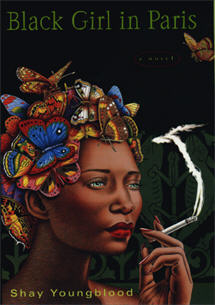 |


|
|
Lambda Literary Foundation Black Girl In Paris , By Shay Youngblood; Riverhead Books, 256 pages; $23.95.
"My name is Eden and I'm not afraid of anything anymore. Like my literary godfathers who came to Paris before me I intend to live a life where being black won't hold me back." So begins Youngblood's tale, and Eden's rumble with life. Twenty-six-year-old Eden arrives in Paris in the fall of 1986, a year when terrorists' bombs are exploding throughout the city. She is 'no stranger to terror,' having grown up in segregated Birmingham, Alabama, during the 1960s; she endures years of nightmares after the church bombing that killed four little girls like herself. By age 13, Eden has moved with her solemn, quiet, 'old like grandparents' parents to Georgia where she learns to love stories and singing, courtesy of her Aunt Victorine Eden's salvation. Aunt Vic's stories become Eden's brightest light, but Eden doesnít have the confidence to let her own words shine; instead, she hid them by writing between other peopleís lines in books her father rescues from trash bins. After graduating from college, Eden works at a museum where her longing for Paris is further intensified. A chance visit by French-speaking black museum-goers/ tourists pushes Eden over the edge and onto a flight to her future and the book's raison díêtre.
It's through these adventures that Eden discovers her bare necessities "love and language" and they are the stuff of stories by firelight, brandy, and lots of cigarettes. Eden learns French by immersion (a sometimes clumsy process), and meets a steady stream of characters along the way, each of whom seems to know or know of Jimmy Baldwinó Eden's guiding spirit. During her year-long quest, Eden becomes a traveling companion, an artistís model (twice), an au pair, a poet's helper, an English teacher, a lover, and a thief. Several of her experiences 'some comical, some sobering' are relayed in a how to format: "How to be an au pair instructs: Look innocent, act naive, Try not to lose the children, and Rise early, turn up late, for starters." Youngblood's descriptions of Eden's desire for male and female attractions make us ache with her. While at a Turkish bath, Eden and the thief Lucienne soak and sweat and heal together. "I wanted to mold my flesh into hers, sink and dive beneath the surface of her skin and swim and swim and swim. ... I touched her in places I couldn't see. Liquid, fragrant blooms, opening. Youngblood is a master of erotic description. Throughout Black Girl, all of Eden's roads seem to lead to Jimmy, no matter the curves and potential dead-ends. As Eden creates her map to find love and language, she learns lessons that help her form confidence as a black woman. Her most important lesson is one of writing: The map eventually leads to home inside the heart. Youngblood's second novel reads like a French travel diary of fantastic, sometimes unbelievable experiences. It is a thoroughly enjoyable, engrossing trip. Lisa C. Moore is the editor/publisher of Redbone Press |
 © 1997-2000 BEI
© 1997-2000 BEI
 Shay Youngblood's new book, Black Girl in Paris, is a wonderfully evocative and lyrically written novel describing a young woman's search for identity on the streets of Paris. Youngblood's first novel, Soul Kiss, was a powerful coming-of-age story, but lest you think Youngbloodís province is the bildungsroman, think again. Youngbloodís latest protagonist is coming into womanhood and writing an entirely different subject.
Shay Youngblood's new book, Black Girl in Paris, is a wonderfully evocative and lyrically written novel describing a young woman's search for identity on the streets of Paris. Youngblood's first novel, Soul Kiss, was a powerful coming-of-age story, but lest you think Youngbloodís province is the bildungsroman, think again. Youngbloodís latest protagonist is coming into womanhood and writing an entirely different subject.